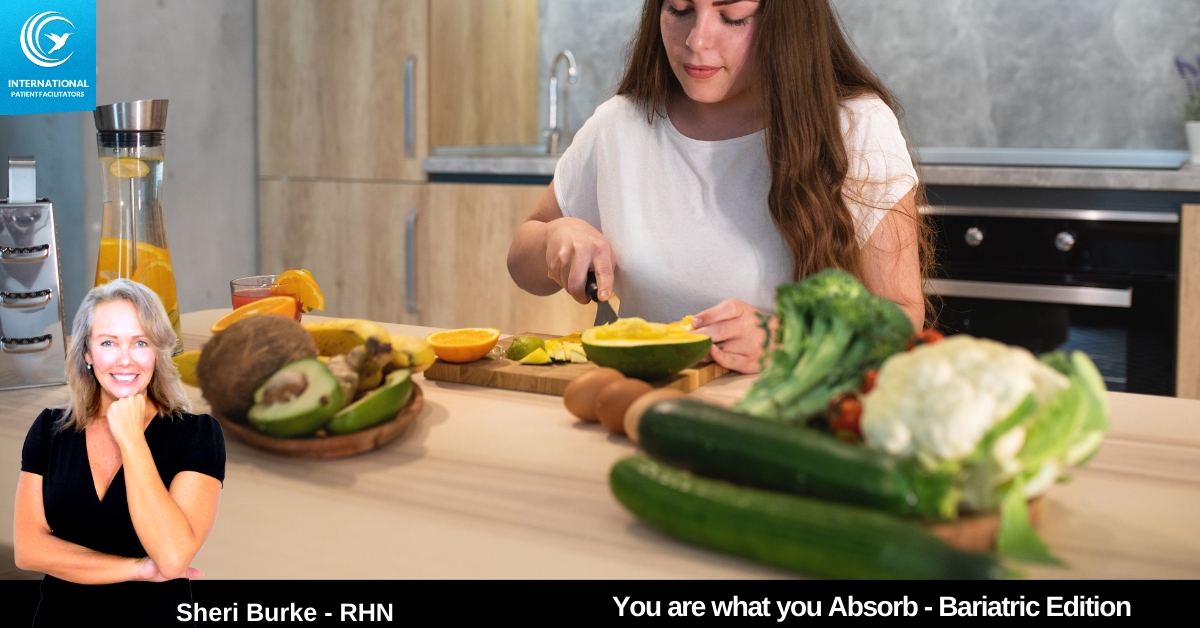You are what you eat … well, not really. You are what you digest, absorb, and assimilate.
What the heck does that even mean? Let’s dig in.
Yes, we’ve heard the expression time and time again, “You are what you eat”. Well, if that is the case, then why is it that some people can eat a super nutritious diet and STILL experience nutrient deficiencies post VSG surgery?
I can explain nutrient deficiencies very easily in Mini Gastric Bypass and Full Gastric Bypass procedures. You have not only “restriction” but also a “malabsorption” component post bypass. This means that eating takes on a whole new meaning and it needs to be taken very seriously to avoid nutrient deficiencies.
But what about the sleeve surgery (VSG)? In this procedure, there is no “malabsorption” part to the surgery. This means that you will digest, absorb, and assimilate everything that you eat, right? …
… WRONG – if you have terrific digestion, then you will digest, absorb, and assimilate everything that you eat and if your diet is nutrient balanced, you will not experience any nutrient deficiencies. BUT, if you have poor digestion (which a lot of us have), then you need to be extra careful.
So how do you know if you have sluggish digestion and how can we improve it? Here are a few ideas that we can all incorporate into our lives to improve our digestion and to get the biggest bang for our buck when it comes to the foods that we eat.
My favorite suggestion is exercise. That’s right, exercise can help to move your food through your body by a series of contractions. This is called peristalsis. If you sit on the couch after dinner watching Netflix, peristalsis is slowed down and can come to a standstill. Exercise increases our metabolism. This makes peristalsis (muscle contractions) more frequent. Taking a walk after lunch or dinner helps to digest the food and makes us feel more comfortable.
I talk a lot about fiber. Fiber comes in plenty of foods. If we don’t eat enough fiber we can also take it in a
Fiber Supplement Fruit and vegetables can give us the fiber to create good bacteria and stronger gut health.
We need to eat in a relaxed fashion. We can help our digestive system by slowing down and chewing more. Digestion begins in the mouth. Help your stomach out by chewing your food more. Your teeth are your stomach’s helpers.
Add some fermented food to your diet. These types of food have been partially broken down by microorganisms such as bacteria. Sounds scary but it’s not. These bacteria are beneficial to us. They also are already in our guts. They help us digest the foods we eat. You can find these healthy bacteria in foods like yogurt, kefir, kombucha, miso, and sauerkraut. If you don’t like these types of foods, then you can get a
Probiotic Supplement It contains the healthy bacteria that your gut needs to properly digest your food.
Do you take acid reflux meds? Do you take PPIs (proton pump inhibitors)? It is out of my scope of practice to tell you to stop taking these medications but it is in my scope of practice to educate people about the side effects of taking PPIs. They can lead to nutritional deficiencies. Please take the time to do some research as to why PPIs can severely affect you and cause nutrient deficiencies.
Keeping a food journal can help to identify key foods that affect your digestion. It can help you figure out food triggers. For example, when I drink coffee or red wine, I get indigestion and acid reflux. If I eliminate these two things, my digestion is greatly improved. What an easy fix! Remove the bothersome drinks, and my digestion is improved.
Apple Cider Vinegar is an at-home remedy that helps my clients with their digestion. I recommend taking a capful in a 1/4 glass of lukewarm water upon waking. This will help to improve HCI (hydrochloric acid) in the stomach. If we have stronger HCI, we will have stronger digestion. If you absolutely cannot stand ACV, you can get it in a supplement form –
Apple Cider Vinegar Supplement
The bottom line, after bariatric surgery, we need to take care of our new tummies. We need to stay away from refined and processed foods that are vacant in nutrients. We need to eat whole, live, fresh, natural food and to take supplements when required. Food first and supplements second.

